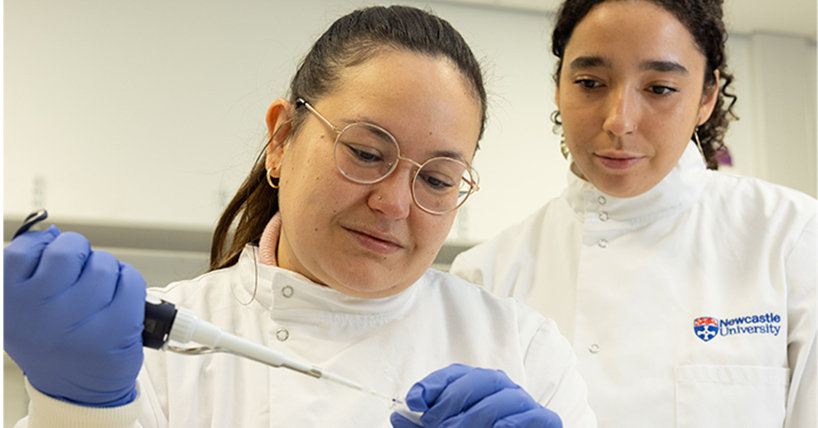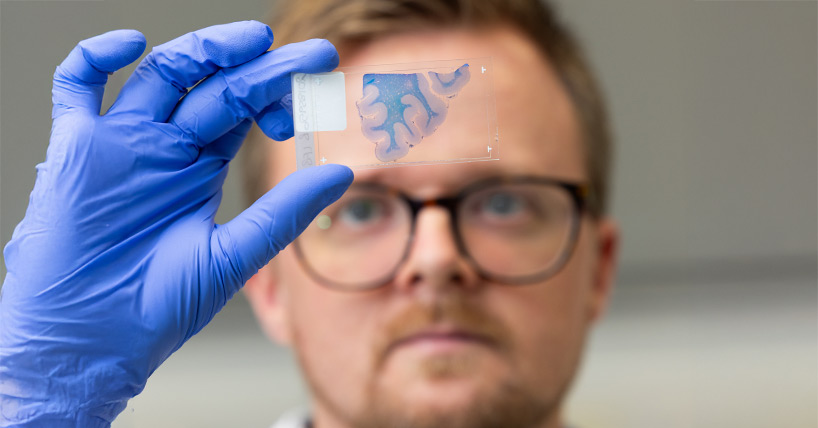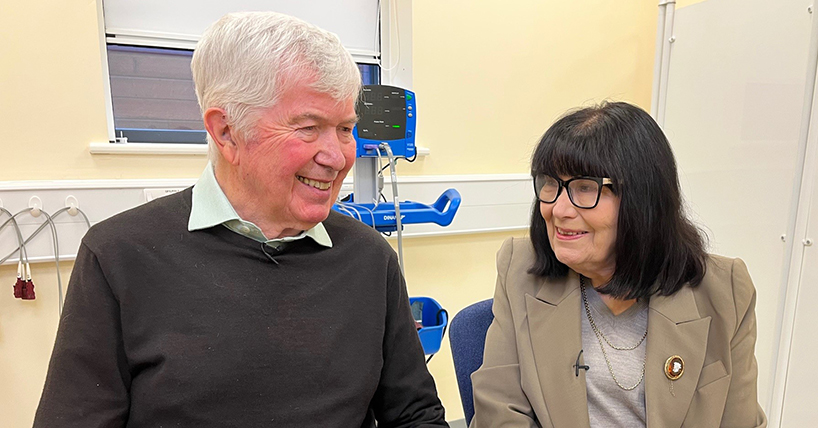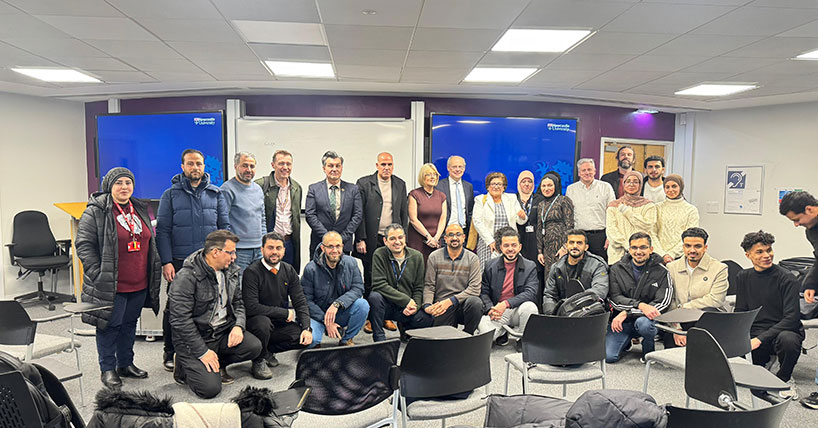Queen Elizabeth Prize for DLB
Royal recognition for University’s Dementia work
Published on: 25 November 2025
Newcastle University has won the UK’s highest national honour for universities in recognition of work transforming the understanding, diagnosis and care of people with Dementia with Lewy bodies.
The prestigious Queen Elizabeth Prizes for Higher and Further Education are awarded by the monarch every two years in recognition of world-class excellence and achievement at academic institutions. Newcastle University has been recognised with a Queen Elizabeth Prize for Education in this round and the last one in 2023, for excellence in water research.
Dementia with Lewy bodies (DLB)
Dementia with Lewy bodies (DLB) is the second most common form of dementia after Alzheimer’s disease, affecting an estimated 130,000 people in the United Kingdom and researchers at Newcastle University have transformed global understanding, diagnosis, and treatment of the condition.
DLB gained public attention following the death of actor Robin Williams whose widow described his battle with the condition as “the terrorist inside my husband’s brain” highlighting the devastating toll the disease takes on individuals and their families. It is a complex and often misdiagnosed disease causing problems with understanding, thinking, memory and judgement as well as movement difficulties, visual hallucinations and sleep disturbances, placing a profound strain on patients and their families.
For over 30 years, researchers at Newcastle University have led the way in redefining DLB as a distinct and common cause of dementia. Their work has reshaped clinical practice worldwide, improving outcomes and offering hope to those affected.
Key breakthroughs include:
- Identifying brain changes in relation to clinical symptoms that are related to DLB which helped establish international diagnostic guidelines. This was made possible by Newcastle University’s Brain Tissue Resource, which with over 2,200 donors is one of the UK’s largest brain donation programmes.
- Establishing dopamine-transporter (DAT) brain imaging as a diagnostic tool for DLB which is now recognised as the global gold-standard for accurate diagnosis.
- Linking biological changes to symptoms and progression, enabling earlier detection even before the dementia symptoms and more personalised care.
- Revolutionising treatment by discovering severe depletion of the brain chemical acetylcholine in DLB. This led to the first successful trials of therapies in DLB that restore its balance - now a global standard treatment that improves cognition and reduces hallucinations. Their research also exposed the risks of certain antipsychotic drugs, prompting safer prescribing practices worldwide.
Today, Newcastle University continues to lead the field, exploring disease mechanisms, developing stem-cell models, and investigating blood-based tests and personalised therapies to detect and manage DLB earlier and more effectively.
This progress has been underpinned by the NIHR Newcastle Biomedical Research Centre and the Newcastle Health Research Partnership and been enabled by wide-ranging support from international and national funders along with industry partners.

New international standards for dementia care
Professor John-Paul Taylor, professor of Translational Dementia Research, Newcastle University said: “The Prize is recognition of the significant work and efforts of the Dementia with Lewy bodies team at Newcastle University over the past 30 years.
“Through close collaboration with patients, clinicians, and scientists across the globe, the University’s work has elevated DLB from an overlooked condition to a clearly defined, diagnosable, and increasingly treatable disease - setting new international standards for dementia care.
“We are building on this legacy with a vibrant multidisciplinary team that continues to strive to improve diagnosis and care of those affected.”
Professor Chris Day, Vice-Chancellor and President, Newcastle University, added: “This award is a great honour and a testament to the outstanding achievement of our team and the wider University community.
“Built on the visionary early work of scientific and clinical pioneers at Newcastle University, the Prize recognises more than three decades of ground-breaking research and unwavering dedication that have significantly advanced the diagnosis and care of individuals and families affected by Dementia with Lewy bodies.
“We are proud that our work is making a difference globally, and we remain committed to building on this world-leading research to further improve diagnosis, treatment, and ensuring healthier ageing for future generations.”

Celebrating excellence, innovation and public benefit
Run by the Royal Anniversary Trust, the Queen Elizabeth Prizes for Education celebrate excellence, innovation and public benefit in work carried out by UK colleges and universities.
Sir Damon Buffini, Chair of The Royal Anniversary Trust said: “The Queen Elizabeth Prizes for Higher and Further Education celebrate the power of education to change the world for the better. This much-loved national honour recognises, at the highest level of state, outstanding work in UK universities and colleges, and the remarkable benefit they bring to our economy, society and the wider world. This year we are delighted to honour 19 institutions whose work offers an inspiring snapshot of the excellent and innovative work going on in universities and colleges across the UK. Congratulations all!”
The Prime Minister, Sir Keir Starmer added: “This is a landmark year for the Prizes marking 30 years of recognising and celebrating the tremendous contribution our universities and colleges make to the life of our country.
“The UK has always been a place of learning, invention, and ambition. Our institutions of higher and further education are among the very best in the world. They educate the next generation, train our workforce, and lead the cutting-edge research that drives progress, not just here at home but across the world.”
This is the fifth time the University has been awarded what was previously known as the Queen’s Anniversary Prize and one of two in the region with Gateshead College being recognised for its construction training programme. The University gained the prize in 2023 for excellence in water research, in 2013 in recognition of its internationally renowned research into sustainable rural economies and societies. Newcastle received the prize in 2009 for research into ageing and again, in 2005 for its innovative solutions to mine water pollution.

A patient's perspective
Nigel Thomas, who is 79 years old and from Cleadon Village, South Tyneside and his wife Heather who is 78, shared with us their thoughts about Nigel’s diagnosis of Dementia with Lewy Bodies and the care they have received through the Newcastle team:
Nigel said: “I have lost some confidence in being independent. I now rely on my wife to organise much of my life although I do many of the basic household activities
“Before diagnosis and during early treatment I was confused, as I couldn’t understand what was happening to me. I know that some of my behaviour had changed; for example, I have become obsessive in ensuring I was carrying my wallet, spectacles and phone. I have also become slower in movement and I have lost some height.
“I dread to think what my circumstances would be if we had not met Professor John-Paul Taylor and his team and received comparatively early intervention with a tailored regime of vital medication which is constantly reviewed. Furthermore, I am appreciative of the team’s sensitivity, consideration, referrals and constant academic enquiry.
“Lewy Bodies had not however affected my ability to speak, read and write and to continue to be fluent in English or any of the foreign languages, especially French, German and Italian, that I have learnt.
“What is particularly important to me is my passion for military history. I have retained the core knowledge but prior to treatment by Newcastle University I did struggle in using my iMac. Now I can do this independently and in fact I am at present updating my rank insignia charts for an important commission which is a source of pride for me.”

Heather said: “The fact that Nigel is wholly functioning intellectually is a blessing. We discuss our shared interests in history, politics, media and news and the Times General Knowledge quiz during the coffee break is a ritual.
“DLB has affected me in many ways. Firstly, to be defined as a ‘carer’ was a surprise even though I was in fact caring for Nigel. By my late 70’s I’d had many roles - student, educator, parent and wife. Marriage was partnership whilst we were independent of one another with regard to our careers, study, friendships and so on. Nigel’s diagnosis meant that he was dependent on me and I lost much of my independence. I now manage all aspects of running the house and finances, our daily living, driving and I organise my life around his diary.
“It was very difficult at first for relatives, friends and casual acquaintances to understand Nigel’s condition which was quite frankly upsetting. Nigel didn’t appreciate his decline physically and only recently have we engaged in discussing this aspect of Lewy Body Dementia. Fortunately, most people closest to us are now interested and helpful.
"We are very fortunate at being patients at an exceptional GP medical group and that there is a first rate pharmacy close to our home that delivers our medication.
“Quite frankly without the support of Newcastle University, Nigel would have been dependent upon daily or even residential care. Without a diagnosis and the remarkable treatment life would have been almost intolerable. Meeting Professor John-Paul Taylor and his team transformed our lives.”
Read more from Nigel and Heather as they discuss their DLB journey and the support they've had from Newcastle in their From blog.

Useful information:
Find out how you can support research into Dementia with Lewy Bodies at Newcastle University.
Find out more about brain donation and the Newcastle University Brain Tissue Resource.
More information on research into dementia at Newcastle University and the work of the Lewy Body Lab at Newcastle University.
Information on the DIAMOND-Lewy Programme – focused on improving diagnosis and management of Lewy body dementia across the NHS.



